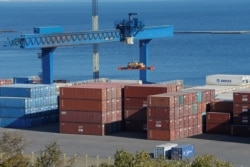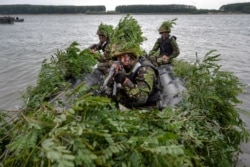Top diplomats from Ukraine, Georgia and Romania are urging the United States and NATO to step up their presence in the Black Sea region to discourage Moscow from advancing its aggressive agenda.
Ambassadors from the three countries, all of which border the sea, voiced their concerns Thursday at an event organized by the Middle East Institute’s newly inaugurated Frontier Europe Initiative.
Sitting at the crossroads of Europe, Asia and the Middle East, the Black Sea has been fought over for centuries, noted Ukrainian Ambassador Volodymyr Yelchenko. More recently, Russia has enlarged its footprint around the strategically vital waterway by directly or indirectly seizing territory from Georgia in 2008 and from Ukraine in 2014.
“We alone don’t have the capability to stand up to Russia,” acknowledged Yelchenko, who was joined in that assessment by Georgian Ambassador David Bakradze. Both urged the United States to bolster its presence in the region and to strengthen its allies and partners.
Greater US, NATO presence
The U.S. and NATO presence in the Black Sea region “skyrocketed” immediately after the Crimea crisis in 2014 but has since tapered off, said Heritage Foundation analyst Luke Coffey in an interview with VOA.
In a paper published earlier this year, Coffey described the Black Sea as “having been fought over by some of the world’s major empires. Throughout history, it has proven to be one of the most geopolitically and economically important locations in the broader Eurasian region.”
Fuel, shipping
Oil and gas pipelines, as well as fiber-optic cables, run along the bottom of the sea, while hundreds of ships crisscross its surface daily moving people and goods, said Coffey, director of the Douglas and Sarah Allison Center for Foreign Policy at Heritage.
For Russia, the sea is also the maritime gateway to the Mediterranean Sea, the Suez Canal and strategic points beyond.
Coffey argued for a continuous NATO presence in the region, saying “every single day of the year, there should be at least one NATO ship” in the Black Sea.
He acknowledged that NATO countries presently lack the ships and possibly the political will to maintain such a robust presence, especially with budgets constrained by the coronavirus pandemic. “Surface warships are very expensive defense capability.”
He called for “creative solutions,” looking at how air and land assets could accompany a projection of naval force. The situation needs to be looked at “holistically,” he said, taking into account the differing levels of enthusiasm in the region for any alliance with the U.S. and its NATO partners.
Romania, Coffey said, is the most enthusiastic NATO member among the countries that border the Black Sea, whereas Turkey wields the most maritime power in the region after Russia.
Ankara support seen vital
The ambassadors from Georgia, Romania and Ukraine agreed that no regional initiative is likely to bear fruit without the support of Ankara. “We would like to see Turkey more engaged,” said George Maior, Romanian ambassador to the United States.
Romania, he said, has worked diligently and consistently with the Pentagon to increase and enhance the U.S. military presence, both on land and at sea.
Several participants in the forum expressed hope that the United States and NATO would devote the same attention and resources to the Black Sea region as they have to the three Baltic states, all NATO members since 2004.
While NATO membership still seems a distant prospect for Georgia and Ukraine, Coffey said that should not be ruled out.
“If you were to ask people in the early 1990s what the prospect of Poland, Latvia joining NATO was, the answer you would likely get was ‘impossible,’ ” he said. Today both are not only alliance members but among the staunchest supporters of the institution.
“We shouldn’t let Russia have the unofficial veto” over Georgia and Ukraine, he said.






